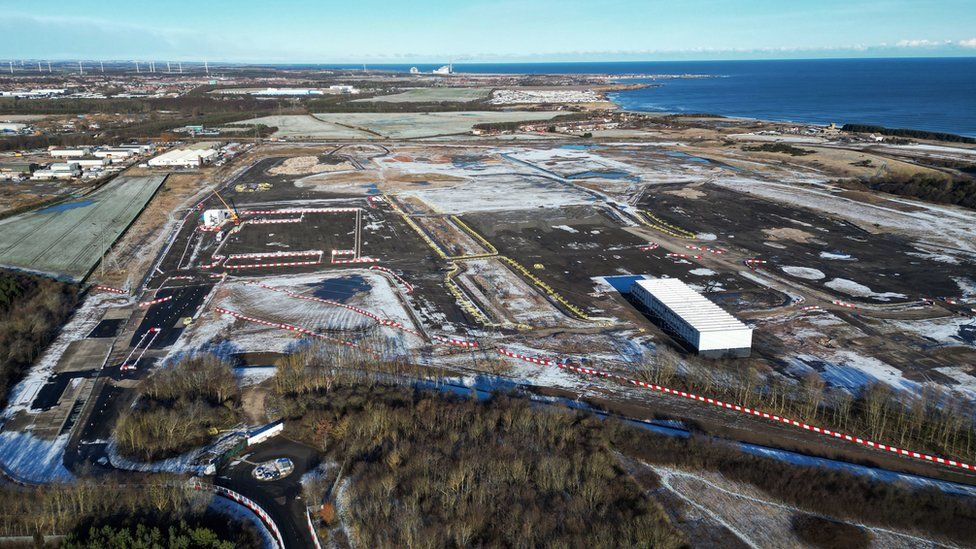ARTICLE AD BOX
 Image source, PA Media
Image source, PA Media
Britishvolt had been developing a £3.8bn gigafactory near Blyth, Northumberland
By Simon Jack
Business editor
The new owners of collapsed firm Britishvolt are planning to use the Northumberland site to supply batteries to the Australian military.
Australian firm Recharge Industries bought Britishvolt after it went into administration earlier this year.
Since then Recharge has been in negotiation with administrators EY to also secure use of the site near Blyth.
EY declined to comment, but people familiar with the matter said a deal was "close".
Securing use of the site is the crucial first step in Recharge's plan to build batteries for military, heavy commercial and stationary storage purposes.
Australian energy firm EDEA has been involved in talks with Recharge to build power units for Australian military vehicles.
The BBC understands a deal would see Recharge paying EY £2.5m for outstanding fees. It would pay an additional £11m to property investor Katch, which has a financial claim to the site.
If it does go ahead, the planned manufacturing plant would not produce batteries for mass market cars for the foreseeable future, but it is hoped it would still provide thousands of jobs in the north east of England.
However, the BBC understands members of Northumberland County Council still have doubts over Recharge's ability to deliver the multibillion pound plant.
Britishvolt collapsed in January after its former owners failed to secure government funding, which Recharge Industries has said it does not need.
But the Australian firm, which is ultimately owned by a New York-based investment fund called Scale Facilitation, is also a start-up with little battery manufacturing experience. It bought Britishvolt out of administration.
Securing the coveted Northumberland site is a crucial first step in Recharge's plan to supply batteries for military, heavy commercial and stationary storage purposes. Australian energy firm EDEA has been involved in talks with Recharge to deliver their contract to supply batteries for Australian military vehicles.
Ian Lavery, Labour MP for Wansbeck, which includes the Cambois site, said he hoped the plan would be an economic boost for the north east of England.
There had been a number of "false dawns" on this project, he told the BBC, but having met some of the principal players in the deal he was "cautiously optimistic" it could now move ahead and ultimately create thousands of highly skilled jobs directly and in the supply chain.
The Northumberland site is considered ideal for building batteries because of its close proximity to offshore power grids. But its previous owners were dogged by concerns that the business lacked a track record in battery development, sufficient funding and obvious customers.
Many of these same concerns linger over the new owners.
The New York investment fund which owns Recharge Industries is run by Australian, David Collard, who has a background in finance rather than engineering.
David Collard, chief executive of Scale Facilitation
The BBC understands that members of the Northumberland County Council have misgivings about Recharge's ability to deliver on its plan and have an option to repurchase the site in December 2024 if substantial progress has not been made to develop the site.
However, people close to the matter claimed a wealthy European investor "with strong industrial products and infrastructure ties" has been lined up to fund the land deal, and a new proposed structure would ultimately see Recharge Industries rent the coveted site from a joint venture majority-owned by property investors Tritax, which is backed by huge fund management group Abrdn.
There have also been discussions between Recharge and major energy firms about using the site as a convenient connection point for offshore wind farms in the North Sea to connect to the UK mainland. That would generate additional revenue for the site owner.
Potential investors told the BBC that Recharge gaining control of the site would fire the starting gun on a development process they could support.
Supporters also say the project would demonstrate a way to reduce dependence on China for minerals critical to battery production, as Australia has abundant supplies and would be in keeping with the recent AUKUS (Australia UK US) trilateral security pact.
But there are still many question marks over this project.
The investor supposedly putting up the money to secure the site remains anonymous.
The financing of the build of the gigafactory is a multi-billion-pound, multi-stage process that has inherent risk which will need to be addressed and managed over time.
Companies controlled by Recharge's owner, David Collard, are facing ongoing tax investigations in Australia, with which Mr Collard says the company is fully cooperating.
The company has not had any meaningful contact with UK government departments over the plan, which seems strange, given the site's strategic importance to UK industrial ambitions. However, Recharge are not expecting to call on the UK government for financial assistance - unlike the previous owners who hoped to secure £100m in government grants, if they had hit development milestones, which they failed to do.
A plan to build batteries in Northumberland for the Australian military seems unusual - outlandish even. Particularly as Recharge Industries also had plans to develop a battery plant in Geelong, Australia.
But backers say that the power links and geographical advantages of the Cambois site offer a faster route to production and will create a template that can be repeated elsewhere. They also insist that batteries for high volume car makers could be produced at the site in time.
People close to the situation seem confident that this first crucial hurdle - securing the site - is within reach and imminent.
But doubts about the financial and engineering muscle of the new owners to make this new plant a reality persist.

 1 year ago
36
1 year ago
36








 English (US) ·
English (US) ·